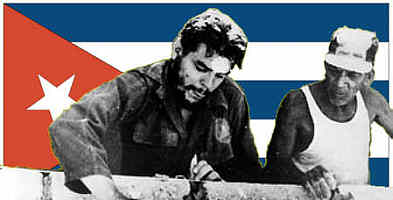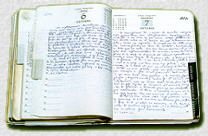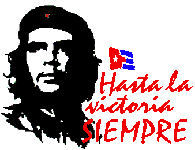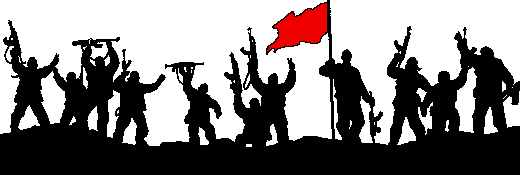|

Che
Guevaras politiske grundlag
Baseret på en tekst af Marc Vandepitte - kopieret fra

En Marxist-Leninist bliver
til
Det Kommunistiske Parti
Kampen mod revisionismen
Den anti-imperialistiske kamp
Væbnet kamp
Nogle konklusioner
En Marxist-Leninist bliver til
As a 14-year old Che Guevara read Freud, Jung and the short version of
"Das Capital". Later, when he was 16 - 17 years old he read the theories of
Marx, Engels and Lenin.
In 1954 he arrives in Guatemala and meets the young woman Hilda Gadea
Costa. Both have read many books on the Soviet-Union and books of Marx, Engels and Lenin.
Hilda, who had studied economy at the university, brings Ernesto to a more systematic
study. She also brings to his notice some books on China: they reveal a whole new world
for him.
During a long trip through Latin-America he
was confronted with the terrible misery of the Latino’s, caused by the subjection to
the imperialist countries. He was also confronted by the failure of the non-violent
resistance in Guatemala to break this subjection. It fortified the correctness of Marx'
theory in Che's mind. But above all, it was especially the concrete experience of the
Russian revolution that was the most important school. In November 1953 he wrote in a
letter from Costa Rica:
"Once more I could convince myself how terrible the capitalist
octopuses are. I swore on a picture of our old and bewailed comrade Stalin, I swore not to
rest before these capitalist octopuses are destroyed."
"I have traveled through entire Latin-America and I know this
continent very well. I have seen poverty, famine, diseases, the impossibility to cure a
child because of lack of medication, the apathy and dull resignation caused by famine and
continuous oppression."
Out of his correspondence with his family and also in the works he
wrote between 1954 and 1956 one can establish how thorough and how convincingly he
dedicated himself to the systematic study of Marxism. Especially political economics,
statistics and other related disciplines. These letters from 1956, he was barely 27 years
old, give an idea in which way the study of Marx (Che always spoke of San Carlos) changed
his medical- into a revolutionary vocation.
"I haven’t got much to tell about my life, seeing that I
spent it being physician and reading books. I think that when I leave here, I will have a
suitcase full of questions on economics, while I’ll have forgotten how to take
somebody's pulse…..It seems that my way slowly removes itself from clinical medicine;
but yet not far enough to erase my desire for an hospital. San Carlos (Karl Marx) has
gained a dedicated follower. I’m busy changing the order of my studies: I used to
devote myself to medical studies as best as possible and spent my free time on the study
of San Carlos, without any real engagement. The new phase in my life demands that I change
that order: now San Carlos is the most important, he is the pivot, and he will be for the
years that the earth will let me live on its exterior crust.
Che looks at the Cuban revolution as the prolongation of other
communist revolutions in the twentieth century:
"This revolution is by some defined as the fundamental
happening of Latin-America. In order of importance it succeeds the trilogy of the Russian
revolution, the victory on the army of Hitler and the following social transformations,
and the triumph of the Chinese revolution."
|
Det
Kommunistiske Parti
The first three years of the Cuban revolution was characterized
by a
great deal of anarchy. Che Guevara warned several time against this anarchy.
"To avoid it there is need of an organism that takes the lead
of the revolution and guides it. That organism is the communist party. The party is a
forefront organization. The best workers are nominated for membership by their comrades.
They form a minority, but due to the quality of its militants the party radiates great
authority. It is our aspiration that she becomes a mass-party, but only when the masses
reach the level of consciousness of the forefront. Meaning: when they have been reared up
to communism. That educative work is our task. The party must be the vivid example through
her militants, an example of dedication and sacrifice. Through their efforts they have to
get the masses to rise up to their revolutionary task in turn. It will take years of heavy
combat against the difficulties that the edification of socialism will bring, against
class-enemies, against misdeeds of the past, against imperialism…In short "the
party's mission is to achieve the dictatorship of the proletariat as soon as
possible."
Che Guevara realizes that the communist party
is crucial for the edification of the socialist revolution. The 'New Human Being' does not
evolve spontaneously. The capitalist awareness is tougher and harder to extinct than a
military enemy. The old habits and convictions are obstinate and can only be got rid off
through a large and severe process of mental transformation. Besides that, imperialism
will not neglect to batter the spirits with propaganda. Finally, the rich West starts from
a principle called the ‘demonstration-effect’. Che sees the ideological
education as a fundamental task for the revolutionary leadership.
"To build up communism one has to, together with the material
basis, create the 'New Human Being'. Therefore it is very important to choose the right
instruments to mobilize the masses. Direct education through experience is most important.
…It has to be organized by the educational apparatus such as the ministry of
education and the party."
Communism will be achieved in stages. The first stage is socialism,
this is a phase of transition to communism.
"We are in… the first phase on the road to communism, or
in the phase of the construction of socialism. This phase is characterized by a violent
battle between the classes and the presence of capitalist elements in society that turbid
the exact issues at stake."
What he means by that, he resumes very brief: "There is no
other valid definition of socialism to us, but to abolish the exploitation of man by
man."
|
Kampen
mod revisionismen
It is not sufficient enough to have a communist party that tries to
build up a new society, there must also be an active battle against all kinds of
ideological deviations which over a long period can perpetrate the revolution. Already in
the beginning of the sixties, shortly after Chroetsjov took power in the Soviet-Union, Che
saw very clearly in which direction it was going over there. Breaking up with the course
of Stalin would inevitable mean the destruction of the revolution from within.
Sure, he criticized Stalin: he blamed him for
organizing a personality cultus and for neglecting the communist education of the masses.
Che called it an "historic crime". But these criticisms were not of a kind to
reject the global course of Stalin, on the contrary. He realized that the break with
Stalin's policy and the attacks on his person opened the gate to liberal and capitalist
elements. And according to Che they were the core of
"In the so called mistakes of Stalin lies
the difference between a revolutionary attitude and a revisionist attitude. You have to
look at Stalin in the historical context in which he moves, you don’t have to look at
him as some kind of brute, but in that particular historical context … I have come to
communism because of daddy Stalin and nobody must come and tell me that I mustn’t
read Stalin. I read him when it was very bad to read him. That was another time. And
because I’m not very bright, and a hard-headed person, I keep on reading
him.
Especially in this new period, now that it is worse to read him. Then, as well as
now, I
still find a Seri of things that are very good."
Che saw that the revisionism of Chroetsjov was not only bad for the
Soviet-Union but also for the revolutionary movements in his continent. Except for
Colombia, all guerrilla-activities in the Latin-American countries were condemned by
Moscow. When Che started his guerrilla in Bolivia, he was betrayed by the Bolivian CP,
which lead to the isolation and the elimination of his guerrilla force.
|
Den
anti-imperialistiske kamp
Many times Che Guevara personally experienced the brutality of
imperialism. Referring to the events in Congo and the, at that time, military interference
of the Belgians he writes in 1964:
"These events learn us two things. First the bestiality of
imperialism, that is not bound to a particular border or a particular country. Beasts
where the Hitlertroops , as the North-Americans are beasts today, or the Belgian elite
forces in Congo, or the French mercenary troops in Algiers. Because it is in the nature of
imperialism that it makes beasts out of men, that changes them into bloodthirsty
predators, willing to slit throats and murder. …"
Those who think imperialism is reconcilable with peace and democracy,
or those who have confidence in the international institutions are mistaken, according
Che.
"The statue of Lumumba reminds us that imperialism is not to
be trusted, not in the least, not at all. (...) It was under the United-Nations flag that
Lumumba was murdered in Congo. And it are the same United-Nations that, according to the
US, should inspect our territories. The same United-Nations!"
|
Den
væbnede kamp.
According to Che the only way to wipe out the bestiality of imperialism
and to end the unbearable misery of the peoples, is to pick up arms.
"We can not and may not cherish the illusion that we can
obtain freedom without battle. These battles won’t be restricted to streetfights with
rocks and teargas, nor will they be peaceful general strikes, nor will it be the battle of
a furious nation that in two or three days will have destroyed the repression apparatus of
the ruling financial oligarchy. This battle means a long war, and I repeat it once more, a
cruel war…"
"Hate will be an element of the battle, a merciless hate for
the enemy, that will inspire the guerrilla-soldier to superhuman efforts of strength and
changes him into an effective, violent, selected, in cold blood killing machine. That is
how our soldiers must be; a nation without hate can not triumph over a brute enemy."
|
Nogle
konklusioner.
The ideas of Che Guevara are still valid today, more than ever so. It
is not because the revolutionary climate is less tangible than thirty years ago that his
ideas have become worthless. On the contrary. Today a great majority of the people on this
planet live in miserable circumstances. The historical experience of the twentieth century
show that there are not too many different ways to get out of it. The easy, so called
"third way" is wishful thinking of many tired and burned out intellectuals today
. They dream of a non-violent, gradual way out of misery. But it is a
phantasm, a believe
in the illusion of an ‘imperialism with humane feelings’. The yearly cost of
imperialism is millions of people that starve to death or die of sicknesses that could
easily be cured.
El Salvador and Guatemala show us that armed struggle as such is no
warranty for success either. Che experienced it in person in Congo and in Bolivia.
Nicaragua learns us that a military victory does not automatic implicate a durable
victory. Cuba shows that a revolutionary communist party is the only way that leads to a
qualitative jump forward and that such party is indispensable for the revolution to hold
firm even in the most difficult of times or situations. And it shows that Che's ideas on
revolution and socialism are no redundant theory.
Fidel Castro, Che and a few comrades in arms began their guerrilla in
the Sierra Maestra at a time that no one believed in victory. But Batista had to run. Che
went to Congo to fight alongside Kabila and Mulele at a time the resistance took some
devastating blows. Their battle seemed without perspective then. Who would have believed
that the Congolese guerrilla, thirty years post-date would triumph after all? Pessimism
was unknown to Che. It’s the unyielding revolutionary optimism, averse to
intellectual doubts, as well as the radical ideas that characterizes this legendary
figure. The same spirit one finds in Cuba today in spite of the extremely difficult
condition, and in spite of all the negative propaganda. Numerous times the end of this
glorious revolution was predicted. If the Cubans had the same fatalist mentality as we in
Europe often show, the island would already have been a North-American colony long
ago.
The writings of Che and even more his way of live are a perfect anti-dote against the
post-modern doubts and actual ideological confusion within the revolutionary movement and
against the capitulation and the revisionism within a great part of the
left. |

Ernesto Che Guevara
1928 - 1967
Hasta la victoria siempre!

"Jeg ved du kommer for at dræbe mig.
Skyd, kujon, du skal kun dræbe et menneske."
Che Guevara, 9. oktober 1967
Fidel i en tale efter Ches død
"Si queremos expresar cómo queremos que sean los hombres de las
futurasgeneraciones, debemos decir: que sean como El Che.
Si queremos decir cómo deseamos que se eduquen nuestros niños, debemos decir sin
vacilación: queremos que se eduquen en el espíritu del Che. "
"If we want to express how do we want men to be in the
future, we must
say: we want them to be like Che.
If we want to say how do we want our children to be brought up, we must say, unhesitatingly
: we want them to be brought up in the spirit of Che. "

Ernesto Che Guevaras dagbog fra Bolivia
Che speaks to the Cuban youth
"Los jóvenes... yo entre ellos... tenemos que estudiar y estudiar
fuerte. Para nosotros no hay eso de que la vista me duele, que no me entra la lectura, que
se me cansa, que no hay espejuelos, que tengo muchas guardias, que los niños no me dejan
dormir... todas esas cuestiones, todas esas cosas que andan por ahí sueltas. Hay que
estudiar de todas todas."
"The young... and I see myself as a young
one... we must study and
study hard. We are not to say that my eyes hurt, that I'm not fond of
reading, that I get tired, that there are no eye-glasses, that I have too many
guards, that the children won't
let me sleep... all those things people come up with. We must study by all
means."
|

Vil du hører melodien om Che?
 
Det tager lang tid at loade...
Hvis lyden hakker, så stop afspilningen - og vent til hele filen er downloadet.

Lyt til Che og Fidel

Granma Che Guevara

|